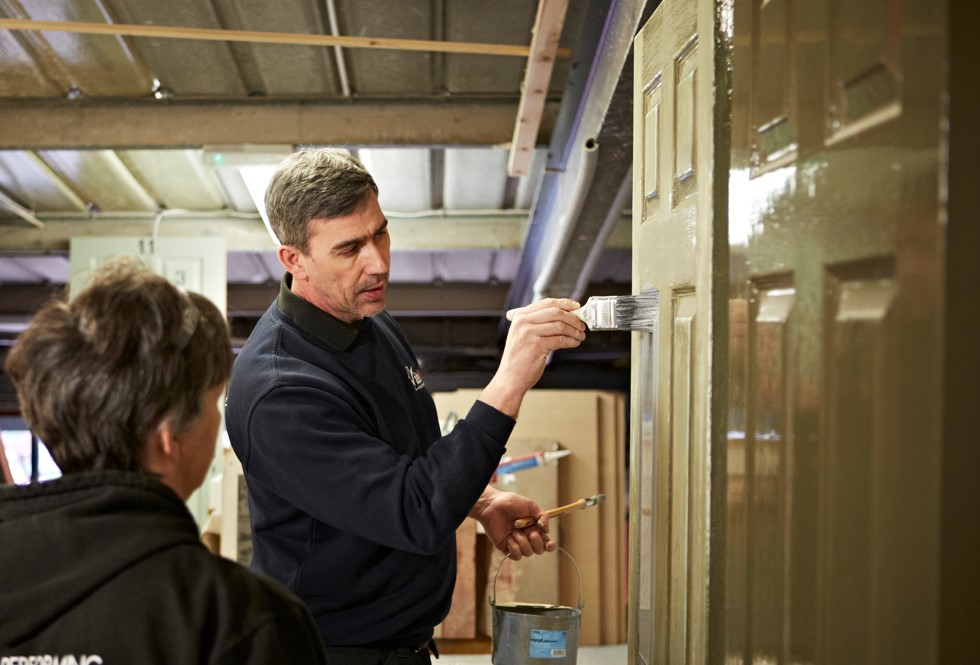
Painters and decorators have an integral role to play in the closing stages of the construction process. Once a structure is ready and in place, it’s up to them to ensure that the final touches are of a high standard and the project looks as good as it possibly can.
Like most construction trades, painters and decorators have been able to make the most of increased demand for their services, with 85% of those working in the industry saying they expect to be busy throughout 2022.
What does a decorator do?
The day-to-day life of a painter and decorator will vary depending on whether you’re working in a domestic, commercial or industrial setting. However, some of the more common tasks include:
- Estimating how much paint and other materials are needed to complete jobs
- Stripping wallpaper and old layers of paint
- Filling holes and cracks to ensure surfaces are level
- Applying primer and undercoat to work surfaces
- Mixing paints to achieve the right shade
- Applying paint coats and hanging wallpaper
- Adding finishes like stains, varnishes and marbling
Why are training and qualifications so important to the profession?
Due to the potentially dangerous environments decorators are required to work in, health and safety are integral to the profession, and this needs to be taught by a qualified instructor. Given that quality plays such a huge part in the trade, professional training is also essential when it comes to developing good habits.
If you plan on working or training on any UK construction site, you’ll need to register for your Construction Skills Certification Scheme (CSCS) card.
You may also want to join the Painting and Decorating Association, the largest trade and employers’ association in the UK painting and decorating industry. The organisation offers business support, including network and training events, guidance on a range of issues from health and safety to marketing, as well as legal support and employment advice.
Decorating courses at Able Skills
Introduction to Painting & Decorating: A short intensive course that is ideal for those who want to gain some basic introductory painting and decorating skills. Those who complete the course will be provided with an Able Skills certificate, assured by City & Guilds.
Advanced Painting & Decorating Course: An ideal follow-on for those who have already completed an introductory course, and who want to learn some more advanced painting and decorating skills.
Hands-on Painting & Decorating Course: A three-week practical course that covers all the essential painting & decorating skills, without the theory or assessments required to gain a formal qualification.
City & Guilds Painting & Decorating Course: An intensive five-week course of hands-on training, during which time you will build a portfolio of your painting and decorating work.
NVQ Level 2 Painting & Decorating Course: A seven-week course that will provide you with the knowledge and skills needed to access the painting and decorating industry, and give you the opportunity to work towards achieving NVQ level 2.
5-Day Wallpapering Course: A short course that covers various aspects of wallpaper hanging.
Level 2 Decorating Diploma: This City & Guilds accredited Level 2 Diploma combines practical and theory-based assessments and is perfect for those looking to come straight in at Level 2.
Experienced Painters who need NVQ: Aimed at those who have been working in the industry for some time, but who do not have the formal qualifications to show for it.
Work-based Assessments for Painting NVQ Level 2: For those who have been working in the industry for less than five years, Able Skills can organise the work-based assessments required to reach NVQ Level 2.
Testimonials
“Able Skills is a great company. I've done two five-day courses with them and would happily go and do more, even though it's a long way for me to go to Dartford from Birmingham - they're definitely worth it. The instructors are friendly and welcoming, very experienced and good at what they do. It's great value for money too.”
- Parm, 5-Day wallpapering course
Flexible decorating training
To ensure construction training is accessible to as many people as possible, Able Skills is able to offer many courses on a flexible, part-time basis, meaning courses can be tailored to fit around prior commitments.
We also offer affordable accommodation close to the training centre, which can be used by anyone travelling long distances to complete their training.